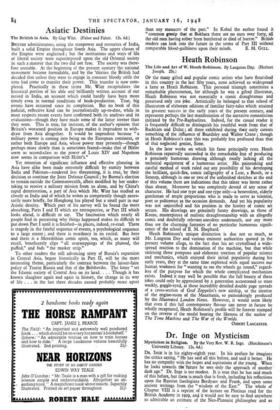Asiatic - Destinies The British in Asia. By Guy Wint. .(Faber
and Faber. 12s. 6d.) BRITISH administrators, using the manpower and resources of India, built a solid Empire throughout South Asia. The upper classes of the Empire Were anglicised ; but the institutions and ways of life of liberal society were superimposed upon the old Oriental society in such a manner that the two did not fuse. The society was there- fore unstable. At the beginning of the present century the national movement became formidable, and by the 'thirties the British had decided that unless they were to engage in constant bloody strife the time had come to transfer their power. This transfer is now com- pleted. Practically in these terms Mr. Wint recapitulates the historical portion of his able and brilliantly written account of our record in India, an account which could hardly have been more timely even in normal conditions of book-production. True, big events have occurred since its completion. But no book of this judicial, reflective kind can be journalistically up-to-date, while in most respects recent events have confirmed both its analyses and its evaluations—though they have made some of the latter sterner than they were. This is true, for instance, of the author's opinion that Britain's worsened position in Europe makes it imprudent to with- draw from Asia altogether. It would be imprudent because " a military power is coming into being on the European continent, or rather both Europe and Asia, whose power may presently—though perhaps more slowly than is sometimes feared—make that of Hitler seem as second-class as the power of Louis XIV and Napoleon now seems in comparison with Hitler's."
Yet retention of significant influence and effective planning in Asia have alike been made extremely difficult by enmity between India and Pakistan—rendered less threatening, it is true, by their decision to continue the joint Defence Council ; by Burma's election to remain outside the Commonwealth, albeit modified by her under- taking to receive a military mission from us alone, and by China's rapid deterioration, a part of Asia which Mr. Wint has studied as closely as India and of which he writes as competently though neces- sarily more briefly, for Hongkong has played but a small part in our Asiatic destiny. Which part of his survey will be found the more absorbing, Parts I and II which are retrospective, or Part III which looks ahead, is difficult to say. The fascination which nearly all people find in perceiving why things happened makes its difficult to put down Part I until it is finished—in places, indeed, re-read. There is tragedy in the fateful sequence of events, a psychological sequence to a large extent ; and there is mordancy in its recital. But here and there is a Meredithian comic spirit, too, which, as many will recall, beneficently clips "all oversteppings of the plumed, the puffed," and bids " the masker strip."
To other readers the still advancing story of Russia's expansion in Central Asia, begun historically in Part II, will be the more interesting theme, particularly the contrast between the laisser-faire policy of Tsarist Russia and that of the Bolsheviks. The latter " set the Islamic society of Central Asia on its head. . . . Though it has known slaughter again and again in history, the change in its way of life . . . in the last three decades caused probably more upset
than any massacre of the past." In Kabul the author found it " common gossip that at Bokhara there are no men over forty, all the old men having either been butchered or died of horror." British readers can look into the future in the terms of Part III without comparable blood-guiltiness upon their minds. E. M. GULL.


































 Previous page
Previous page